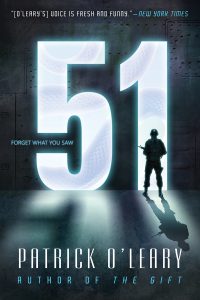Paul Di Filippo Reviews And Put Away Childish Things by Adrian Tchaikovsky
 And Put Away Childish Things, Adrian Tchaikovsky (Solaris 978-1786188793, hardcover, 208pp, $29.99) March 2023
And Put Away Childish Things, Adrian Tchaikovsky (Solaris 978-1786188793, hardcover, 208pp, $29.99) March 2023
Although Adrian Tchaikovsky’s career began, in 2008, with a fantasy novel, Empire in Black and Gold, which kicked off a huge sequence titled Shadows of the Apt, and although he has continued to dip into fantasy realms since (the Echoes of the Fall saga), I must confess that those earlier triumphs had receded from the forefront of my thoughts, elbowed aside by his many recent outstanding SF novels which have won him much acclaim. Tchaikovsky, a fantasy writer? Hardly! So the arrival of this standalone urban-fantasy-cum-portal-adventure was a bit of a surprise. But, rejiggering the settings on my Tchaikovsky GPS, I was quickly immersed in this delightful tale, finding the same qualities—boldness of concept, vividness of presentation and specialness of characters—to be present here as in, say, the Children of Time series.
We start with a scenario guaranteed to enlist the reader’s empathy, mixed with a little not-unwholesome snarky pity. Felix “Harry” Bodie is a middle-aged British actor with a not insubstantial, but hardly earth-shattering career. He’s desperate, drinks a bit too much, and wants Fortune to smile on him unreservedly—and maybe undeservedly. Looking for a bit of a break and some publicity, he agrees to be featured on one of those postmodern This Is Your Life-type shows, the kind, unfortunately, where they dig for dirt. And dirt is dug, in the form of some revelations about Harry’s great-grandmother.
We are told, before the show happens, that Harry’s grandmother, Magda “Mary” Bodie, was famous as the author a long and successful series of children’s books, fantasies about a land called Underhill and its eclectic nonhuman citizens. And in fact, Harry, as sole heir to the Underhill franchise, gets some small royalties even today, long after the series faded from its heights. Magda’s books were inspired by tales told to her by her mother. And what the show has discovered is that this woman was deemed insane and institutionalized. So now Harry’s birthright becomes the ravings of a madwoman, in a certain uncharitable light.
This public broadcast sends Harry into a gloom spiral, and decreases his job opportunities. But it also alerts the larger world to his existence and his connection to the Underhill books.
He is first approached by a woman named Rebecca Seitchman, who offers mysterious benefits to Harry connected to the Underhill property, if he consents to meet with her. When he does, she alludes to the fictional realm of Underhill being a reality. Disdaining this insanity, Harry is shortly thereafter captured by a cult which believes the same thing. They seem ready to torture Harry for knowledge of Underhill which he does not in fact possess. But their plans are thwarted, violently, by none other than some cross-dimensional visitors from Underhill itself. Before you can say “through the wardrobe” (secret historical connections with C. S. Lewis and Narnia are made explicit, as is a sly reference to Bill Willingham’s Fables), Harry finds himself in Underhill, amidst all the characters that informed his juvenile reading. But it’s not a bright and happy world, nor even a simplistic dark and dangerous place. Entropy has taken hold—in a manner I recall from Lev Grossman’s The Magicians trilogy—and Harry is faced with the onerous prospect of becoming Underhill’s redeemer, or just letting it fester. Rebecca Seitchman reappears, and complexities multiply, including the revelation of a metaphorical worm at the center of the sick rose, and the reason why Harry’s great-grandmother ended up in that asylum. The ending to all these machinations and indecisions and perils is unpredictable, yet fatedly resonant, and completely satisfying.
Tchaikovsky is, obviously, working here with major tropes that have gotten good, classical instantiations prior to now which are hard to top. Besides the works I’ve already cited, I’d have to add the Oz books and the motif in Crowley’s Aegypt sequence involving imaginary YA author Fellowes Kraft, whose books were also truly magical. But Tchaikovsky attacks these less-than-revolutionary novums with such verve, certitude and finesse that we easily buy into the ride, which is a fast-moving and exciting one. His depiction of Harry, suffering from a quintessential postmodern malaise—hey, my personal brand is failing!—adds some spice to the book. And then, Tchaikovsky’s refusal to paint Underhill itself as either utopia or dystopia, but rather as a dilapidated artisanal construct, is refreshing.
The colorful inhabitants of Underhill are likewise a nice feature, exhibiting both the classic Midcentury Modern whimsicality of, oh, The Phantom Tollbooth, with more naturalistic personality traits. For instance, the giant spider Smackersnack reveals both pride and reluctance in her assigned narrative role:
“Responding to your rudeness,” came her soft, whispery voice, “we were intended for antagonism indeed. Absence of opportunity led to looking for other options. They created me for creeping and crawling. I picked up the paths of my precursor and perfected them…. We stream,” the spider said, deadpan. “Without webcam.”
Tchaikovsky’s fast-moving book is akin to those great slim but jampacked fantasies of the Forties like The Carnelian Cube, but with a necessary twenty-first century gloss.
 While you are here, please take a moment to support Locus with a one-time or recurring donation. We rely on reader donations to keep the magazine and site going, and would like to keep the site paywall free, but WE NEED YOUR FINANCIAL SUPPORT to continue quality coverage of the science fiction and fantasy field.
While you are here, please take a moment to support Locus with a one-time or recurring donation. We rely on reader donations to keep the magazine and site going, and would like to keep the site paywall free, but WE NEED YOUR FINANCIAL SUPPORT to continue quality coverage of the science fiction and fantasy field.
©Locus Magazine. Copyrighted material may not be republished without permission of LSFF.






